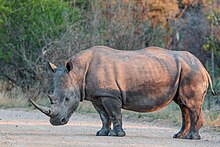rhinoceros
Hello, you have come here looking for the meaning of the word rhinoceros. In DICTIOUS you will not only get to know all the dictionary meanings for the word rhinoceros, but we will also tell you about its etymology, its characteristics and you will know how to say rhinoceros in singular and plural. Everything you need to know about the word rhinoceros you have here. The definition of the word rhinoceros will help you to be more precise and correct when speaking or writing your texts. Knowing the definition ofrhinoceros, as well as those of other words, enriches your vocabulary and provides you with more and better linguistic resources.

White rhinoceros (Ceratotherium simum)
See also: rhinocéros
English

Etymology
From Latin rhīnocerōs, from Ancient Greek ῥῑνόκερως (rhīnókerōs, “nose-horned”), composed of ῥῑ́ς, ῥῑνός (rhī́s, rhīnós, “nose, of (the) nose”) + κέρας (kéras, “horn”).
Pronunciation
- (UK) enPR: rī-nŏsʹə-rəs; IPA(key): /ɹaɪˈnɒs.ə.ɹəs/
- (US, Canada) enPR: rī-nŏʹsə-rəs; IPA(key): /ɹaɪˈnɑ.sə.ɹəs/
- (General Australian) IPA(key): /ɹɑɪˈnɔs.ə.ɹəs/
Noun
rhinoceros (plural rhinoceros or rhinoceroses or (uncommon) rhinocerosses or (nonstandard) rhinoceri or (nonstandard) rhinoceroi or (now rare) rhinocerotes)
- Any of several large herbivorous ungulates native to Africa and Asia of the five extant species in the three extant genera in the family Rhinocerotidae, with thick, gray skin and one or two horns on their snouts.
- 1658, Thomas Brown, “Of Unicorns Horn”, in Pseudodoxia Epidemica: Or Enquiries Into Very many Received Tenents And commonly Presumed Truths. The Fourth Edition, page 203:
- Herein therefore to draw up our determinations beside the several pieces of Scripture mentioning this Animal (which some may well contend to be only meant of the Rhinoceros) we are so far from denying there is any Unicorn at all, that we affirme there are many kinds thereof. In the number of Quadrapedes we will concede no less then five; that is the Indian Oxe, Indian Ass, Rhinoceros, the Oryx, and that which is more eminently termed Monoceros, or Unicornis.
- (paleontology) A member of the superfamily Rhinocerotoidea, including hornless members of the extinct genus Paraceratherium.
Hyponyms
- aceratheriin (†Aceratheriinae)
- African rhinoceros
- black rhinoceros (Diceros bicornis)
- greater one-horned rhinoceros (Rhinoceros unicornis)
- Indian rhinoceros (Rhinoceros unicornis)
- Javan rhinoceros (Rhinoceros sondaicus)
- lesser one-horned rhinoceros (Rhinoceros sondaicus)
- Merck's rhinoceros (†Stephanorhinus kirchbergensis)
- narrow-nosed rhinoceros (†Stephanorhinus hemitoechus)
- one-horned rhinoceros (Rhinoceros spp.)
- square-lipped rhinoceros (Ceratotherium simum)
- Sumatran rhinoceros (Dicerorhinus sumatrensis)
- white rhinoceros (Ceratotherium simum)
- woolly rhinoceros (†Coelodonta antiquitatis)
Derived terms
- rhino
- Rhino, Rhinos (cf. also the homophones: RINO, RINOs, Republican(s) In Name Only)
- rhinocerine
- rhinoceros auklet (Cerorhinca monocerata)
- rhinoceros beetle (Dynastinae spp.)
- rhinoceros bird (Bucerotidae spp.)
- Rhino Party (French: Parti Rhino)
- Rhinoceros Party (French: Parti Rhinocéros)
- Rhinoceros Party of Canada (French: Parti Rhinocéros du Canada) (1963–1993)
- First Rhinoceros Party
- Second Rhinoceros Party
- rhinocerotic
Translations
herbivorous pachyderm with horn(s)
| |||||||
See also
Latin
Etymology
From Ancient Greek ῥῑνόκερως (rhīnókerōs).
Pronunciation
- (Classical Latin) IPA(key): /riːˈno.ke.roːs/,
- (modern Italianate Ecclesiastical) IPA(key): /riˈno.t͡ʃe.ros/,
Noun
rhīnocerōs m (genitive rhīnocerōtis); third declension
- A rhinoceros
- A vessel made of a rhinoceros's horn
- A nickname for someone with a long nose.
Declension
Third-declension noun.
| singular | plural | |
|---|---|---|
| nominative | rhīnocerōs | rhīnocerōtēs |
| genitive | rhīnocerōtis | rhīnocerōtum |
| dative | rhīnocerōtī | rhīnocerōtibus |
| accusative | rhīnocerōta rhīnocerōtem |
rhīnocerōtas rhīnocerōtēs |
| ablative | rhīnocerōte | rhīnocerōtibus |
| vocative | rhīnocerōs | rhīnocerōtēs |
References
- rhinoceros in Karl Ernst Georges, Ausführliches lateinisch-deutsches Handwörterbuch
- “rhinoceros”, in Charlton T. Lewis and Charles Short (1879) A Latin Dictionary, Oxford: Clarendon Press
- “rhinoceros”, in Charlton T. Lewis (1891) An Elementary Latin Dictionary, New York: Harper & Brothers
- rhinoceros in Gaffiot, Félix (1934) Dictionnaire illustré latin-français, Hachette.
